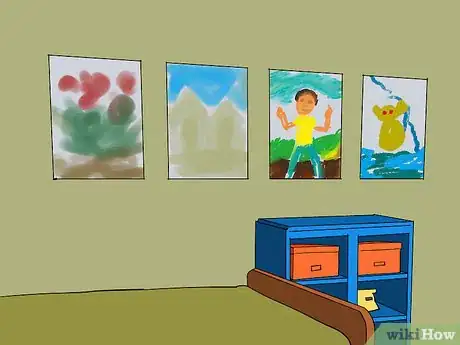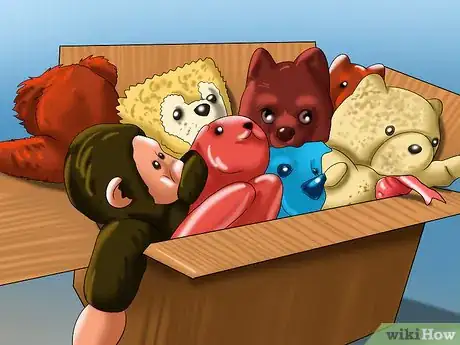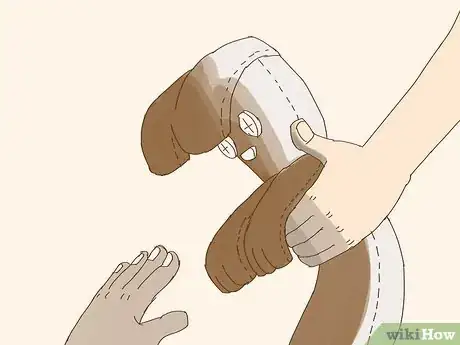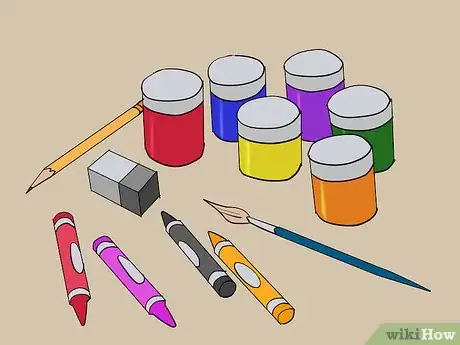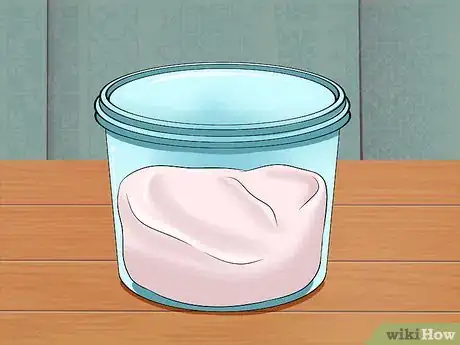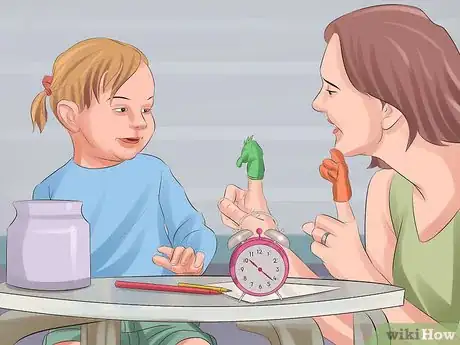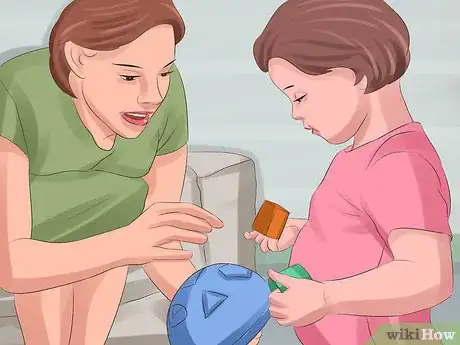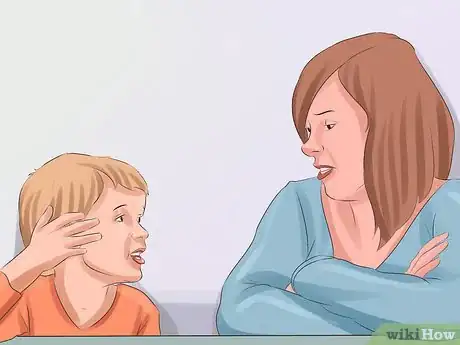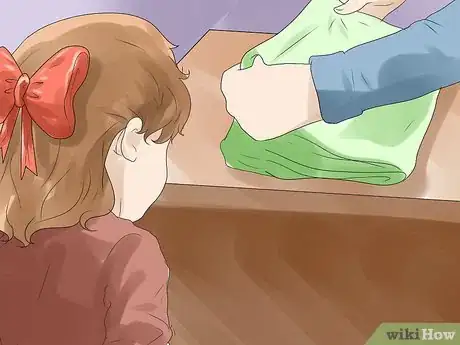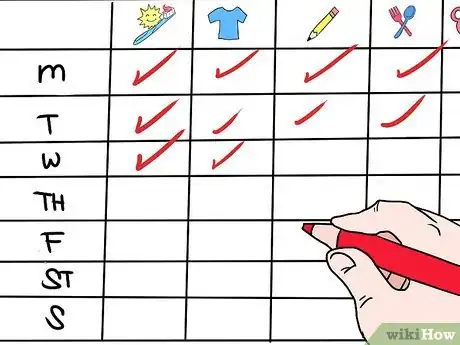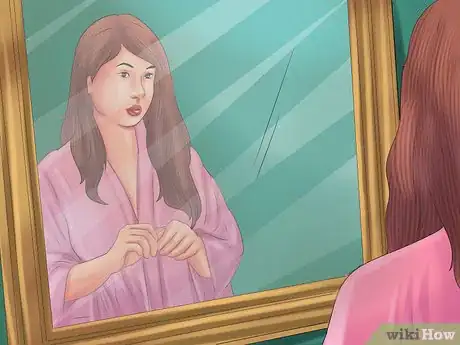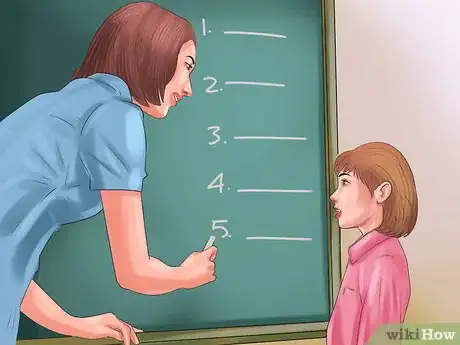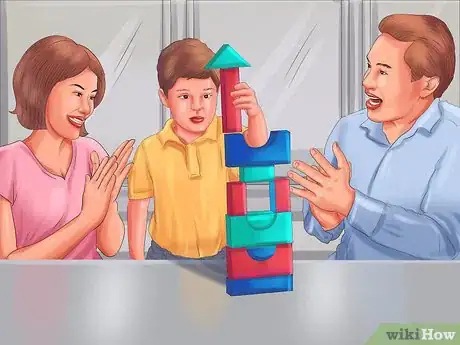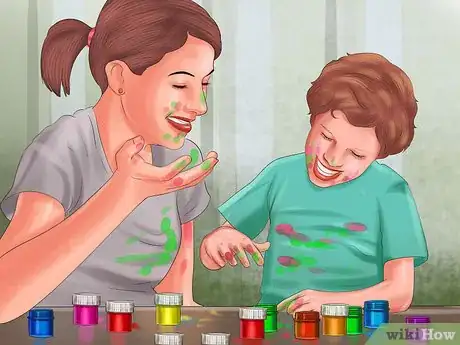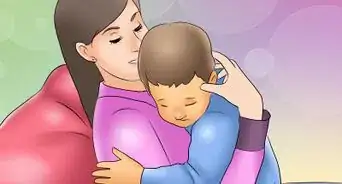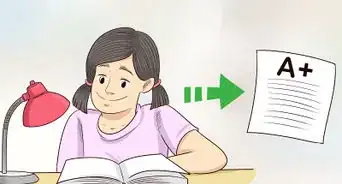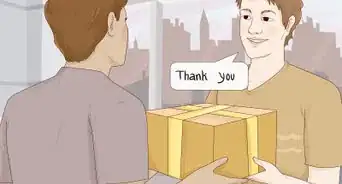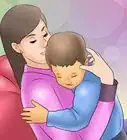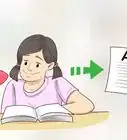This article was co-authored by Kylee Money. Kylee Money is a Parenting Consultant and the Founder and CEO of Parenting Made Joyful. Since 2001, Kylee has worked with over 1,000 parents and families on sleep training, behavior management, potty training, and more. She is a contributing writer and board advisory member at Pampers.com, a CBS News Parent Expert, and featured on Fox and Friends and Buy Buy Baby. Kylee also speaks nationally at parenting expos on the subject of sleep training.
There are 10 references cited in this article, which can be found at the bottom of the page.
This article has been viewed 23,894 times.
It can be difficult to keep a clean house when you have young children. Toddlers and preschool-age kids can make a big mess in a small amount of time. However, there are simple steps you can take to reduce mess. Try to prevent a mess before it happens by having a designated play space, keeping toys organized, and taking precautions with messy materials. Encourage your kids to help with the cleanup, especially as they get older.
Steps
Preventing Mess
-
1Get by with less. If you have less stuff, kids will have fewer opportunities to make a mess. Work on reducing clutter in your home. Minimizing your amount of stuff will result less mess and, in turn, less stress.
- Keep only what you really need in areas of your home like the kitchen, the living room, and the bedroom. Allow for some empty space. Minimize knick-knacks and decorations. If you do use them, put them out of reach of kids.
- Simplify your children's toy collections. Kids can get by with only a few special toys. Try to keep only a few toys out at a time, and encourage kids to use their imagination to play.
-
2Have a designated play space.[1] It can help to have a designated play space in your house. This can help contain mess to a single room, making cleanup faster. It can also help keep kids from getting into areas of the house, like the kitchen or bathroom, where there may be hazardous materials. Have a single section of the living room as the "play space." If possible, use a spare room in the home as a play room.Advertisement
-
3Organize toys. Keeping toys organized can help reduce mess. If kids know where to find their toys, they'll make less mess seeking out certain items. Use baskets, buckets, and cabinets to store different types of toys. You can put labels on baskets so kids know which toys are where. If your kids aren't reading age yet, use pictures as labels. For example, print out a picture of a teddy bear and tape it to the basket where you keep stuffed animals.
-
4Allow your child to take out a new toy only when the old toys are put away.[2] You can help minimize mess by making sure your child only plays with one toy or set of toys at a time. Make a rule that a new toy can only be taken out when other toys are put away.[3]
- Be firm about this rule. Young children may take awhile to get used to a new routine, so gently remind them about picking up their toys.[4] Say something like, "You know you can't get your action figures out until you put away your Legos."
- Avoid cleaning up for your child. You want to make sure a child understands responsibility. You can help a child clean, especially if they are very young, but make sure the child does some of the work on their own.
- You can make exceptions to this rule in certain situations, however. If a child is working on something, like a Lego statue or a drawing, consider permitting them to leave some of the toys out as long as they're out of the way. For example, maybe a child could push a partially made Lego statue to the side of the room, and put any loose Legos back in the box.
- Also, keep in mind some toys may come in sets. For example, your child may have a collection of action figures he or she plays with together. If your child has sets of toys, consider allowing him or her to have one type of toy out at a time.
-
5Have your child play with messy materials on vinyl tablecloths. A simple way to keep mess from spreading is vinyl tablecloths. These easily cleanable brands of tablecloths can be purchased at many furniture or department stores. Toys like paint, play dough, or crafts can be played with on top of a tablecloth. Wiping down a vinyl tablecloth is much easier than scrubbing mess off of a floor or the playdough out of the carpet.
- You can also have your child eat meals and snacks over a vinyl tablecloth. Young children can get messy with food, and this can help contain crumbs and spills.
- Make sure you teach your kids about proper, safe use of art supplies. Make sure they know not to eat or drink craft materials. You should also make sure kids wash their hands carefully after playing with things like paint and playdough.
- Supervise your kids when they're using art supplies. Toddlers may draw on walls for fun, so it may be a bad idea to leave them alone with crayons or markers.
-
6Prevent food and drink messes. In addition to a vinyl tablecloth, there are other steps you can take to reduce messes from food and drinks. Young children with limited motor skills should be given bottles or cups with lids. Use placemats when eating at the table. It's a good idea to have young children place cloth napkins or dish towels on their laps when eating to catch food that may spill.
Encouraging Kids to Clean
-
1Create a routine. Having a routine that your children follow can help keep the house clean. Young children thrive on following specific routines. Set rules you follow every day in regards to clean up. For example, toys always need to be put away before dinnertime. Books need to be put away before it's time for bed. Be consistent with your routine. Kids are more likely to clean up regularly if they're running on a schedule.[5]
- Tell children a few minutes before clean-up time is about to begin. Set a timer to help your child finish playing and prepare to clean up.
- Keep age in mind as you plan your routine. Younger children, between the ages of 24 and 36 months, can do small tasks like putting away toys. You can set a timer to help the kids understand when the chore needs to be completed.[6]
- As children get older, they're able to have daily chores that should be done based on activities. For example, you can have them always put dirty clothes in the hamper and dirty dishes in the sink. You can also have them do things like fill the dog or cat's water bowl when they see it's empty.[7]
-
2Make cleanup fun. Finding ways to make cleanup fun can help give kids incentive to clean. If cleaning time feels like a game instead of a chore, kids will learn to enjoy cleanup as much as playtime.[8]
- Sing a song as you clean. Some classic songs include "Clean up Song" by the Laura Berkner Band or "Clean Up" by Barney.[9]
- Play make believe. Kids around 5 and 6 years old may respond to make-believe. Encourage your kids to pretend while cleaning. You can have your kid, for example, pretend they are running a house cleaning company. Encourage your child to make up a name for his or her company.[10]
- Think of fun challenges. For example, try to get your kids to pick up all the items on the floor by the end of a certain song. If you're working with more than one kid, have a clean up competition. Whoever finishes cleaning his or her room first gets a prize.
- Very young children may respond well to the "color game." You can instruct your child to pick up all the items off the floor that are a specific color. Then, name another color. Slowly, toys will get put away.
-
3Establish rules. If you want your kids to learn to clean productively, make sure you have an understanding over what constitutes a clean room. Set rules for what a clean room looks like and stick to them. For example, you can have rules like, "All toys must be off the floor" and "Clothing should be hung up or in the hamper." You can provide kids with a checklist to complete in order to make sure their rooms are clean.[11]
-
4Encourage kids to take pride in cleaning. Give your kids a sense of pride over how a space looks. If kids feel like a space is their own, they're more likely to feel motivated to keep that space nice.[12]
- Let your children decorate their own rooms. Allow them to put up posters, stickers, and arrange furniture and toys in a way they like. If a child likes the way their room looks, that child will have motivation to keep that space clean.
- Allow your kids to feel like the larger house is their home as well. Allow your kids to hang up their art work around the house, for example, and give them some say in decorating.
- Praise kids for cleaning up. Encourage them to admire how nice a space looks when it's free of clutter, dirty clothing, and other messy items.
-
5Organize chore charts. Chore charts can be a fun way to organize and make sure your home is clean. Try to organize a chore chart, assigning a specific chore to each kid.[13]
- Assign chores based on age. Very young children, such as preschool-aged children, may lack the motor skills to do things like make beds. Assign making the beds each morning to a child in elementary or middle school.
- Try to find a way to make chores kid-friendly. Young children, around the age of 3, may struggle to figure out things like sweeping. You can purchase a child-sized broom at a department store. If your child does not understand the concept of sweeping dirt into a pile, you can place masking tape in a square on the floor. Instruct your child to sweep all the dirt into this space.[14]
- You can find ways to make the chore chart fun. For example, if a child does all their chores for a week, you can assign a medal. Medals can be traded in for prizes like money, new toys, or trips to fun places around town.
Making Small Changes
-
1Get up earlier than your kids. Staying slightly ahead of the game can help keep your house clean. Try to get up before your kids. If there's any mess or clutter that may be difficult to deal with when kids are underfoot, clean it up in the morning hours. You can run a load of laundry, throw some dishes in the dishwasher, dust the shelves, or complete any other chore that needs to be done.[15]
-
2Set up barriers. There are probably areas in your home where young children should not roam. Set up barriers where it's appropriate. Keeping kids out of areas where they're likely to make a mess, like a kitchen, can stop messes before they occur.
- You can use wooden baby gates, which you can buy at most department stores, to block off certain areas of your home. You can put a baby gate up between the kitchen and living room, for example, to keep your kids from getting into kitchen supplies.
- Use rubber bands or childproof locks to block off certain draws in your home.
- Keep certain doors closed at all times. If you don't want your kids in your bedroom, for example, simply keep that door shut. Young children and toddlers are often unable to open doors on their own.
-
3Ask for help. If you're feeling overwhelmed by the mess, ask other household members for help. Ask older children, other relatives, and your partner to help you manage some of the mess. If everyone chips in, mess can stay manageable even with young children to care for.
-
4Have realistic expectations. Try to accept that, on some days, your house will be messier than you like. Young children are unpredictable. They may have needs that needs that take priority over cleaning. Accept that, on some days, toys will remain out and dishes will remain undone. It's okay to allow for messiness on occasion.[16]
References
- ↑ Kylee Money. Parenting Consultant. Expert Interview. 21 May 2021.
- ↑ Kylee Money. Parenting Consultant. Expert Interview. 21 May 2021.
- ↑ http://www.huffingtonpost.com/susan-stiffelman/kids-and-chores_b_1940984.html
- ↑ Kylee Money. Parenting Consultant. Expert Interview. 21 May 2021.
- ↑ http://www.parenting.com/article/5-ways-to-get-your-kid-to-clean-up
- ↑ http://www.today.com/parents/what-chores-what-age-guide-parents-2D80555366
- ↑ http://www.today.com/parents/what-chores-what-age-guide-parents-2D80555366
- ↑ http://www.parents.com/parenting/better-parenting/secrets-to-cleaning-with-kids/#page=6
- ↑ https://www.rcsdk12.org/cms/lib/NY01001156/Centricity/Domain/67/CleanUpSongs.pdf
- ↑ http://www.parents.com/parenting/better-parenting/secrets-to-cleaning-with-kids/#page=8
- ↑ http://psychcentral.com/lib/tips-for-getting-kids-to-clean-their-rooms/
- ↑ http://psychcentral.com/lib/tips-for-getting-kids-to-clean-their-rooms/
- ↑ http://www.parents.com/parenting/better-parenting/secrets-to-cleaning-with-kids/#page=13
- ↑ https://www.apartmenttherapy.com/5-strategies-to-keep-the-house-clean-and-your-sanity-intact-with-young-kids-199841
- ↑ https://www.apartmenttherapy.com/5-strategies-to-keep-the-house-clean-and-your-sanity-intact-with-young-kids-199841
- ↑ https://www.apartmenttherapy.com/5-strategies-to-keep-the-house-clean-and-your-sanity-intact-with-young-kids-199841

